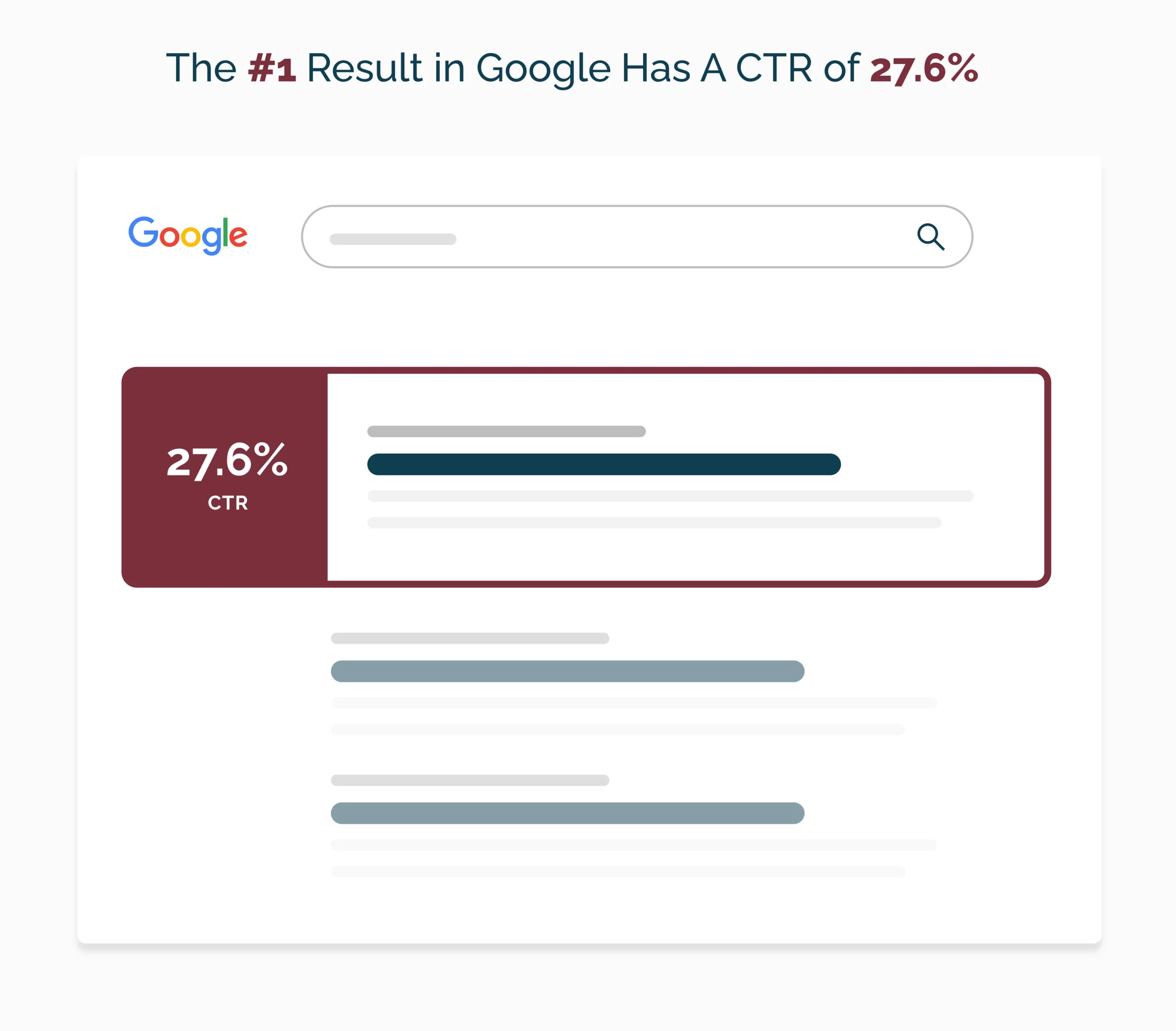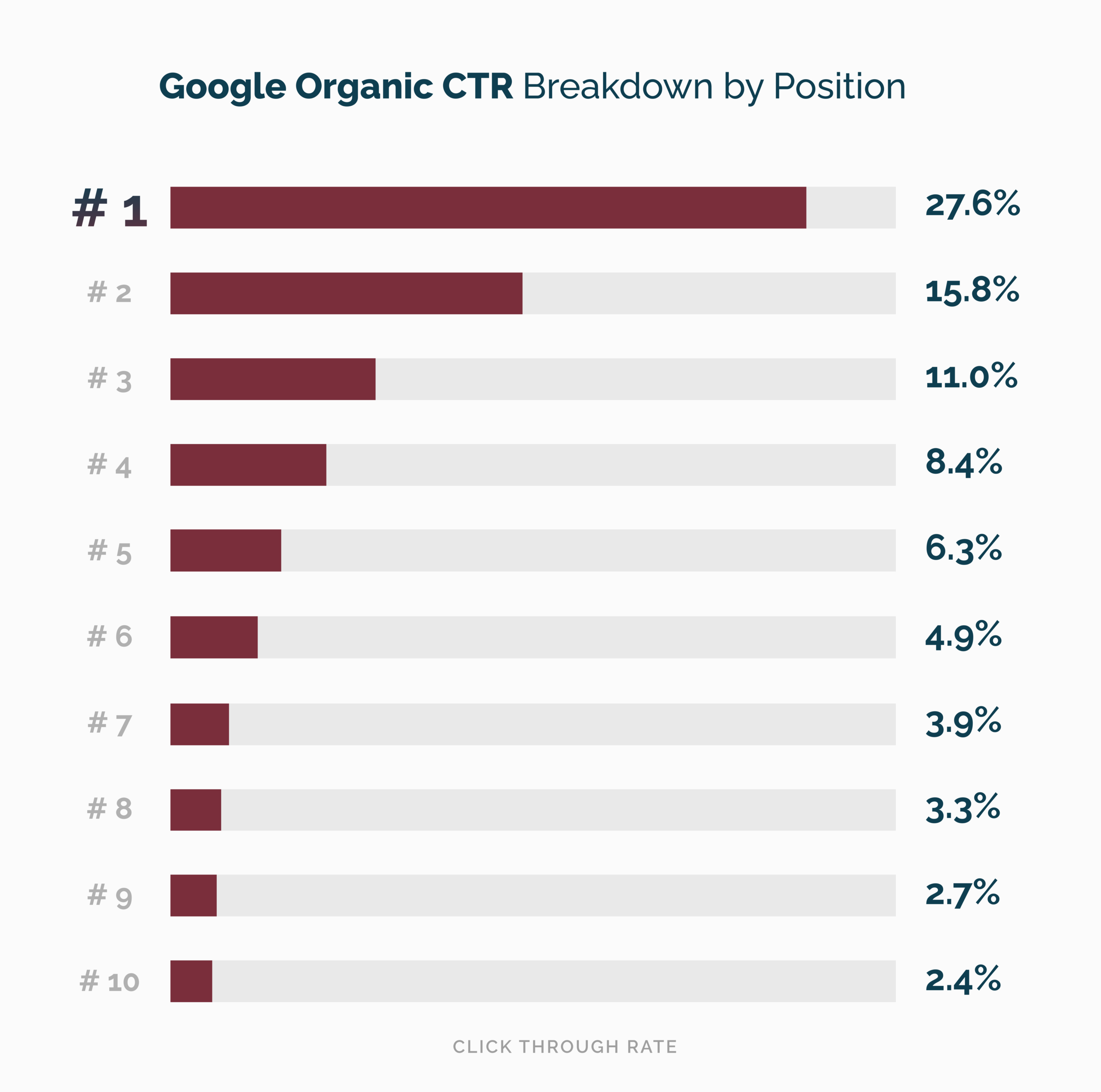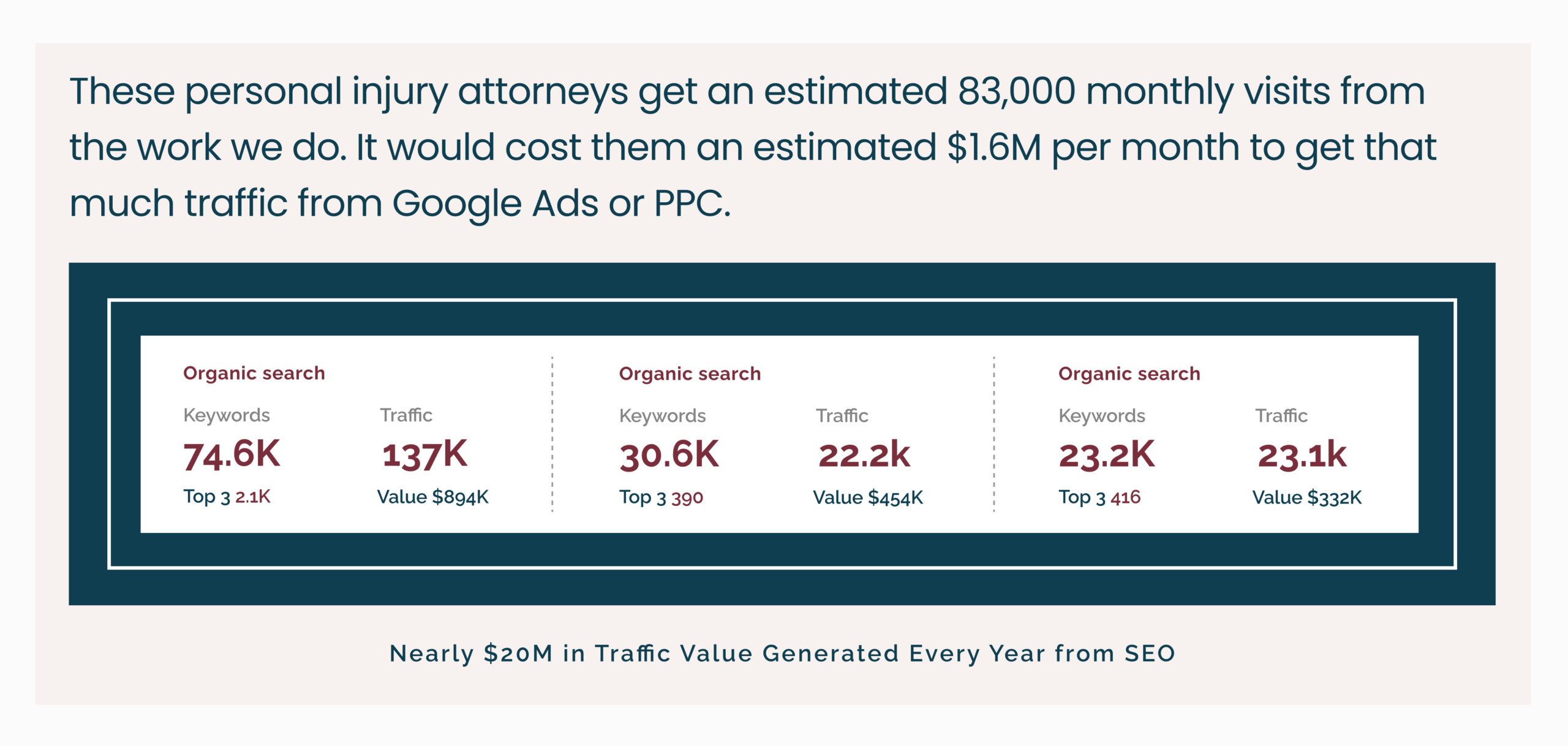Chapter 1
SEO FOR LAWYERS:
THE ULTIMATE GUIDE TO LAW FIRM SEO
What is Attorney SEO?
Attorney Search Engine Optimization (SEO) refers to the optimization of a law firm’s online presence to improve its visibility in search engine results.
SEO aims to attract organic (non-paid) traffic to a website by optimizing various elements, including content, keywords, meta tags, and backlinks.
The quality of a website determines its ability to rank for relevant searches. Prioritizing law firm SEO is essential to appear prominently in Google search results and attract meaningful traffic.
Whether you’re new to LSAs or looking to refine your existing campaigns, this guide is your compass in the promising landscape of Local Service Ads for lawyers.
Why is SEO for Lawyers Important?
In a recent survey from 2022, 64% of people said they would search on Google to find an attorney.
Let’s take this a step further. The first three results on Google get more than 50% of all clicks, with the top spot receiving about 27.6%. of them.

The click-through rate drops as you move down in position, with the last spot on page 1, position #10, coming in at just over 2%.

Now imagine two law firms, equally skilled and reputable. One is easily found on Google; the other is buried on page 10. Which one do you think gets the client?
That’s the power of SEO. Visibility when it matters the most, and ensuring that your firm is the first choice for those seeking legal assistance.
The Benefits of SEO for LAWYERS
Let’s break down the real perks of a solid SEO strategy:
- Increased Visibility: It’s like having the best billboard on the busiest digital highway—everyone sees you.
- Targeted Traffic: Attracting visitors actively seeking legal services means higher chances of converting them into clients.
- Enhanced Credibility: High search rankings are the digital equivalent of a high-end office location. It signals trust and authority.
- Competitive Edge: Outrank your competitors and be the go-to choice for legal services.
- Cost-Effective Marketing: Compared to traditional ads, SEO is the gift that keeps giving. Invest and reap the benefits for years.
Why Law Firms Should Aim to Rank in the Top 3 Google Search Results:
- Dominant Click-Through Rates: The top result in Google search receives a staggering 27.6% of clicks, and this trend continues for the next few positions. A law firm in the top spot has significantly higher visibility and more users reaching their website over competitors.
- Drastic Drop in Visibility Beyond the First Page: Only 0.63% of users visit the second page of Google results.
- Impact of Search Intent on Click-Through Rates: Branded searches, which are more specific and often used by individuals seeking specific law firms or legal advice, have higher click-through rates. This underscores the importance for law firms to optimize for both branded and non-branded keywords.
- Mobile Search Trends and Local Searches: A significant volume of searches occur on mobile devices. A high percentage of these searches are local in nature. This is why law firms need to optimize for mobile search. Your website should be mobile-friendly and target local SEO to appear at the top of searches such as “law firm near me”.
Ranking in the top three Google search results is not just a matter of prestige, but a critical business necessity for your law firm. It ensures maximum visibility, leverages the nature of search intent, and caters to the growing trend of mobile and local searches.
We need to add something like this from our attorneys with the highest traffic value.

Understanding Google Ranking Factors - Law Firm SEO Fundamentals
Google’s ranking factors can seem mysterious. Still, they’re about understanding what your potential clients want and how they search for it. Chapter 2 dives deep into this topic, for now let’s dive into the essentials:
Content: The Heart of Your Law Firm's Online Presence

Content is the primary conduit through which you communicate with potential clients and search engines. Through content you showcase your expertise, impart valuable information, and respond to the inquiries of your prospective clients. Here are three core content elements crucial for SEO success of your law firm:
Importance of Content:
High-quality content is pivotal in establishing your law firm as an authoritative figure in the legal landscape. By creating informative and engaging content, you can build trust with your audience.
Structure of Content:
The organization of your content can significantly impact user experience and search engine comprehension. A clear structure with headings, subheadings, and a logical flow will make your content easily navigable and enhance readability. This organization is not just about user convenience; it also helps search engines understand and appropriately rank your content.
Choosing the Right Keywords:
Keywords act as connectors, linking potential clients’ searches to the relevant content on your website. Effective keyword integration involves understanding the language and terms your potential clients use, then embedding these naturally within your content.
By making useful and well-organized content and using the right words, you’re not just adding words to your website. You’re building a helpful online guide that attracts and informs possible clients while showing you’re an expert in your field. In addition to increased online visibility, you are building trust and connection
Backlinks: The Endorsements of the Digital World
Backlinks are the digital equivalent of word-of-mouth recommendations in the legal world. Imagine every link to your website as a vote of confidence from another site saying “We trust this law firm’s content enough to send our visitors their way.” But as with any endorsement, the quality and relevance of the source are paramount.

The Power of Quality Backlinks
The right backlinks tell search engines, “This content is valuable, credible, and useful.” High-quality backlinks boost your site’s authority and drive relevant traffic your way. It’s like having a well-respected attorney pointing clients in your direction.
Local SEO: Building Community Trust
For law firms, local relevance is critical. Local backlinks, such as those from local chambers of commerce or regional legal associations, are like community endorsements. They enhance your visibility in local search results, making your firm more accessible to those in your immediate area.
Citations: Your Digital Footprint
While not all citations include a backlink, they are crucial for local SEO. Accurate and consistent citations across the web reinforce your firm’s legitimacy and help potential clients find you easily.
Legal and Non-Legal Directories: Diversifying Your Profile
Legal directories are like specialized endorsements, speaking directly to your expertise and authority in the legal field. On the other hand, general business directories contribute to your overall online presence, indicating that your firm is a well-established business. Together, they create a balanced and robust backlink profile.
In conclusion, backlinks are vital to your law firm’s SEO strategy. They are an investment in your digital reputation that can yield significant dividends in online visibility and client trust.
Technical SEO: Building a Solid Foundation
Technical SEO lays the foundation for your online presence. It ensures your law firm’s website is well-structured, easily understood, and favorably viewed by search engines.
Here are five core elements of technical SEO, each critical to your site’s success:
Site Speed & Performance:
- Why It Matters:A slow-loading site can deter potential clients in an era where patience is thin. Site speed impacts user experience and search rankings. A fast-loading site is like a well-organized office; clients can find what they need quickly and without frustration.
What to Do: Optimize images, leverage browser caching, and minimize code. Regularly test your site’s speed using tools like Google’s PageSpeed Insights to ensure it’s performing optimally.
Mobile Optimization:
- Why It Matters: A recent study by Merkle Inc. found that over 60% of all online searches are now on a mobile device. With more people using mobile devices to search the web, a mobile-friendly site is no longer optional. It’s about meeting your clients where they are, on their phones, looking for legal help.
- What to Do: Ensure your website has a responsive design that adapts to various screen sizes. Test your site’s usability with Google’s Mobile-Friendly Test and make necessary adjustments.
Why It Matters:
- Why It Matters: If search engines can’t crawl and index your site effectively, it’s like having an unlisted number in the phone book. You’re there, but no one can find you.
- What to Do: Use a robots.txt file to guide search engine bots, submit a sitemap to major search engines, and regularly check for crawl errors in Google Search Console.
Site Structure – Secure & Accessible URLs:
- Why It Matters: Secure and well-structured URLs are like clear, well-marked roads leading to your office. They help search engines and users navigate your site easily.
- What to Do: Implement HTTPS to protect your site’s integrity and user data. Structure your URLs logically and keep them concise. Use hyphens to separate words and avoid complex parameters when possible.
Example law firm website site structure :
Structured Data (Schema Markup):
- Why It Matters: Structured data is like a detailed business card for your website. It helps search engines understand your content and provide more informative results to users.
- What to Do: Implement schema markup for your law firm, attorneys, and reviews. This can enhance your appearance in search results with rich snippets, making your listing more prominent and informative.
Focusing on these five core aspects of technical SEO can significantly improve your law firm’s online presence. By ensuring your website is fast, mobile-friendly, easily crawlable, securely accessible, and well-understood by search engines, you’re setting a strong foundation for all your SEO efforts.
User Experience: Crafting Your Digital Office

User Experience (UX) is about creating a welcoming, efficient environment that reflects your firm’s professionalism. A website with excellent UX is intuitive, fast, and accessible. It guides potential clients smoothly toward the information they need and your services.
Core Web Vitals:
Core web vitals are crucial in shaping this experience. Website visitors expect quick load times and immediate access to information. Ensuring your website loads swiftly and functions smoothly keeps visitors satisfied and engaged.
Mobile-friendliness:
A mobile-friendly design improves user experience and positively affects your Google rankings. Google’s mobile-first indexing gives priority to mobile-friendly websites when ranking and indexing them. This means your site’s mobile version is crucial. Search engines prefer responsive and mobile-optimized sites, which leads to better visibility.
Navigational clarity:
Ensure that all information on your website is well-organized and easy to find. Use clear navigation menus and labels to guide visitors to the content they’re looking for. Prevent unexpected layout shifts by designing your website with consistency in mind. Make sure elements such as headers, menus, and buttons remain in the same position across different pages.
Branding:
Colors, layout, and content should reflect your firm’s identity and values. A well-designed website that aligns with your firm’s brand provides visitors a consistent and reassuring experience, much like a well-furnished office would for clients.
How to Implement SEO for Lawyers: A Strategic Blueprint
Implementing SEO for your law firm is like developing a legal strategy for a case. It requires careful planning, understanding of the landscape, and precise execution. Whether you’re taking a DIY approach or considering hiring a dedicated law firm SEO expert, each step should be thoughtful and aimed at enhancing your firm’s online presence.
Here, we break down the steps involved in legal SEO. We’ve incorporated references to our dedicated chapters on specific SEO subtopics (where applicable).
Buy a Domain & Choose a Web Hosting Service
Buying a Domain for your Law Firm
Obtaining a Domain Name for your law firm is comparable to establishing your firm’s digital address. This choice should reflect your firm’s identity and ethos, much like how you would select your office location carefully. Web hosting, on the other hand, is the foundational platform that ensures your law firm’s website is accessible and functional at all times.
Examples and Benefits of Branded vs Non-Branded Domain Names for Law Firms:
Branded Domain Names:
- Example:
- SmithLegal.com
- JohnsonLawGroup.com
- Benefits:
- Brand Recognition: These domain names are directly tied to your firm’s name, reinforcing your brand with every visit.
- Trust and Credibility: Clients are more likely to trust a website that is clearly associated with a known law firm.
- SEO Advantages for Brand Searches: When potential clients search for your law firm by name, a branded domain is more likely to appear at the top of search results.
Non-Branded Domain Names:
- Example:
- DenverAccidentAttorney.com
- EstatePlanningExperts.com
- Benefits:
- Descriptive and SEO-Friendly: These domains can be target keyword specific, making them potentially more SEO-friendly for those specific search queries.
- Market Reach: Non-branded domains can attract clients who are not searching for a specific firm but for a service, expanding your market reach.
- Instant Service Recognition: They provide immediate insight into the types of legal services offered, which can be advantageous for niche practices.
Choose a Web Hosting Service for Your Law Firm
When choosing a web hosting service for your law firm, consider the following key points:
Reliability and Security: Opt for a hosting service with high uptime guarantees and robust security measures to ensure your website is always accessible and client data is secure.
Scalability and Performance: Choose a provider that offers scalable solutions to accommodate your firm’s growth. Your provider should ensure high website performance and speed for an optimal user experience.
WordPress Compatibility: If you’re considering using WordPress for your website, ensure the hosting service is optimized for WordPress. This includes one-click install, automatic updates, and specialized WordPress support for ease of management and better performance.
Craft an Excellent Web Design & User Experience
To make your digital office as welcoming and efficient as your physical one, you must craft an excellent web design and user experience. Effective web design plays a pivotal role in building trust and credibility, as a well-designed website communicates professionalism and reliability to visitors.
Your website’s design should reflect your firm’s values, and make it easy for users to find the information they need.
Conduct Keyword Research
Effective keyword research is crucial for understanding what your potential clients are searching for online.
Identify relevant keywords and phrases that align with your legal services, and integrate them naturally into your website’s content. This helps ensure that your site appears in search results when potential clients are looking for the legal assistance you offer.
Craft High-Quality Content
We cannot overstate the importance of high-quality content in SEO. Engaging, informative content keeps visitors on your site longer. Search engines read this as a signal that your site is a valuable resource.
Quality content is more likely to be shared and referenced, further enhancing your site’s visibility. In addittion, it allows for the natural integration of keywords, improving your search rankings.
Technical Requirements
A website that meets key technical requirements is more likely to rank higher in search results.
Fast loading times, mobile responsiveness, and robust security measures contribute to a better user experience, which is favored by search engines. Ensure your website is easily crawlable and indexable. Use a proper site structure and an XML sitemap to make it easier for search engines to understand and rank your content. This directly impacts your site’s visibility in search results.
Quality Link Building
Link building is a fundamental aspect of SEO. Search engines use links to determine the credibility and authority of a website.
High-quality, relevant backlinks act as endorsements, increasing your site’s perceived value and improving its ranking in search results. Focus on acquiring links from reputable and authoritative websites. These sites have a more significant impact on your SEO efforts.
Create & Optimize Your Law Firm’s Google My Business Profile
Enhancing your law firm’s Google My Business (GMB) profile is crucial for increasing your online presence, particularly in local searches.
A well-optimized GMB profile provides potential clients with essential information about your firm such as location, contact details, business hours, and services offered. It also allows clients to leave reviews, which can significantly influence the decision-making process of others seeking legal services.
Optimization involves:
- Ensuring all information is accurate and up-to-date
- Regularly posting updates or articles related to your legal services
- Encouraging satisfied clients to leave positive reviews
- Including high-quality images of your firm and staff
Hire a Law Firm SEO Expert
Improving your law firm’s online presence goes beyond simple SEO tactics; it requires a dynamic strategy that adjusts to Google’s constantly changing algorithm. Google frequently updates its algorithm to improve search results and user experience.
A professional SEO agency’s role is to stay ahead of these changes. They are skilled at adjusting strategies to match these updates, so your law firm’s website stays competitive in search rankings.
Great SEO experts go beyond effective on-page and off-page optimization. They proactively update their clients about these core updates and their potential impact. By hiring a SEO agency, you delegate the complex, ever-changing world of SEO to experts. This allows you to focus on your legal practice, while they ensure your website’s visibility and competitiveness in search engine results.
If you are looking to work with a law firm SEO expert, give our agency a call.
Tracking SEO: Measuring Your Digital Success
Just as a lawyer tracks the progress of a case, following your law firm’s SEO performance is crucial for understanding its impact and guiding future strategies. By monitoring specific metrics, you can gauge the effectiveness of your efforts, identify improvement areas, and make data-driven decisions.
In Chapter 9, we’ll deep-dive into measuring SEO results. For now, let’s highlight the key factors to keep in mind. (LINK CHAPTER URL)
- Organic Traffic: Monitoring the number of visitors coming to your site from search engines gives you a clear idea of your SEO’s reach. An increase in organic traffic generally indicates that your visibility in search engine results is improving. Use tools like Google Analytics to track this metric and understand which pages draw the most visitors.
- Keyword Rankings: Knowing where your site ranks for key terms related to your practice is essential. Use keyword tracking tools like Google Search Console or Ahrefs to monitor your positions for targeted keywords.
- Engagement Metrics: It’s not just about getting visitors to your site; it’s about keeping them there. Metrics like bounce rate, pages per session, and average session duration give insight into how users interact with your site. Are they finding what they need? Are they engaging with your content? High engagement levels generally indicate that your site is valuable and relevant to your audience.
- Conversion Rate: Ultimately, your law firm’s website aims to convert visitors into clients. Tracking how many visitors take a desired action (like filling out a contact form, calling your office, or downloading a resource) helps you understand how effectively your site turns visitors into leads. This metric is crucial for calculating the ROI of your SEO efforts.
- Local Visibility: For law firms, local SEO is crucial. Track your firm’s appearance in local search results and on platforms like Google My Business. Are your contact details accurate? Are you appearing in the local pack for relevant searches? Maintaining a strong local presence is crucial for attracting clients in your area.
LAW FIRM SEO GUIDE

“Hiring Everspark to do the comprehensive SEO audit of my website was money very well spent. They are thorough, knowledgeable and approachable.”
-Mike Rafi
READY TO WORK WITH ONE OF THE BEST LAW FIRM DIGITAL MARKETING AGENCIES?
Put Your Law Firms Marketing In the Best Hands
Pop in your details and we’ll schedule a call.
"*" indicates required fields